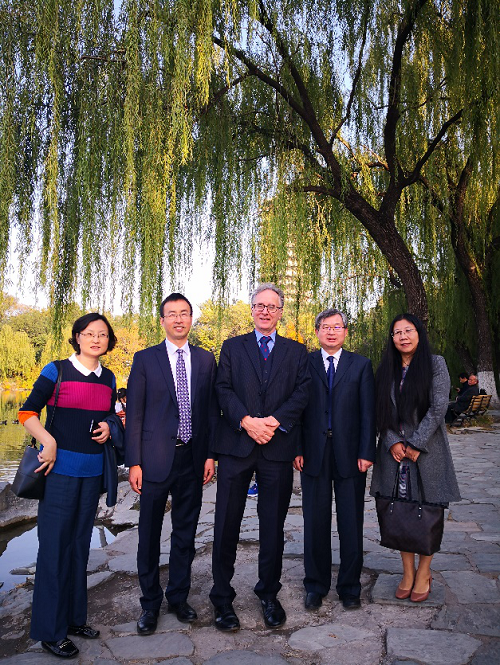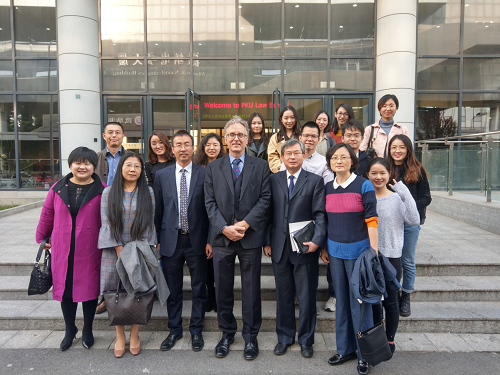The "International Intellectual Property Issues: Theoretical Exploration and Practical Application" Roundtable Forum was successfully held
Date:2018-11-06
On the afternoon of October 19, 2018, the “International Intellectual Property Issues: Theoretical Exploration and Practical Application” of the 2018 Series Forum of Intellectual Property Law and Technology Law of Peking University was successfully held in the Office of the Intellectual Property Office of (Leo) Koguan Building of Peking University.
The roundtable forum was hosted by Antony Taubman, Director of the Intellectual Property and Government Procurement and Competition Division of the World Trade Organization, and the World Trade Organization Intellectual Property and Government. Counselor Wu Xiaoping, Director of the Department of Purchasing and Competition, Professor Guo Wei, Associate Dean of Peking University Law School, Associate Professor Cui Guobin, Associate Dean of Tsinghua University Law School, Professor Du Ying, School of Law, Central University of Finance and Economics, Dr. Zhang Jinping, Lecturer, School of Law, Central University of Finance and Economics, China University of Political Science and Law Dr. Zhang Nan, a lecturer at the China-US Law Institute of the Institute of Law, and dozens of doctoral and master students in the law school of Peking University Law School attended the forum.
The forum was hosted by Professor Liu Yinliang of Peking University Law School. Prof. Guo Wei, Associate Dean of Peking University Law School, extended a warm welcome to the guests of Anthony and Wu Xiaoping, and gave a brief introduction to the development of Peking University Law School and international cooperation. Professor Liu Yinliang introduced the work experience and academic background of Director Anthony Tubman. Director Taborman served as Director of the International Intellectual Property Section of the Australian Department of Foreign Affairs and Trade (DFAT) and Global Intellectual Property Issues of the World Intellectual Property Organization. Director of Division of WIPO) has a comprehensive study of issues related to international intellectual property protection, especially the TRIPS Agreement. Director Tuboman also undertakes teaching work at universities such as the University of Melbourne, the Australian National University and the Queensland University of Technology. He is also an Australian registered patent attorney and has handled a large number of patent and trademark cases. He has profound intellectual property theory and rich practice. experience.

From the left in the front row
Director Taberman, Professor Guo Wei, Counselor Wu Xiaoping
Subsequently, Director Taborman introduced the development and challenges of the international intellectual property system, especially the international intellectual property treaty in the context of new technological development. He pointed out that with the advancement of science and technology and the development of the economy, developing countries have gradually established their own intellectual property system, which has brought about new intellectual property law issues. At the same time, developed countries that have strong protection of intellectual property rights The attitude of the intellectual property system such as compulsory licensing has also changed. From an international perspective, it is of great significance to use comparative research methods to study the practice of intellectual property in various countries. The original international intellectual property law, especially the international treaties, have been continuously adjusted according to the practical experience of national intellectual property rights to guide the application of new intellectual property laws. The international intellectual property treaties and the intellectual property practices of various countries have interacted with each other and used for reference. We are currently at the development node of international intellectual property rights. The new environment, new technologies and other factors have brought unprecedented challenges to the development of intellectual property rights. The exploration of its legal or policy response also guides us to the origin and purpose of intellectual property rights. Make more reflections and research on the basic issues.

Director Taborman
Later, Professor Du Ying, Dr. Zhang Nan, Dr. Zhang Jinping, and doctoral and master students of the law of intellectual property law at Peking University Law School respectively conducted the focus and hot issues of the development of international intellectual property law and Director Taborman. Discussion and communication.
Professor Du Ying discussed with the interests of interest groups in international intellectual property rights and the current role of the WTO in different interests and even disputes in countries such as China and the United States. Director Taborman pointed out that in the current international environment, the organizations and institutions involved in the development of the national intellectual property system are more diverse. Governments, enterprises and non-governmental organizations (NGOs) from different countries also present the consultation dialogue. More enthusiasm than ever before. The WTO is committed to providing exchange mechanisms in the activities of different countries and institutions. At the same time, it analyzes and summarizes current practice changes and legal challenges and issues for reference. In response to new practical issues and challenges, the WTO also tried to adjust its work content to meet the needs of the new technology era.
Dr. Zhang Nan asked questions about how to ensure the balance between the instrumentality of intellectual property rights and the attributes of welfare safeguards. Director Taborman pointed out that the WTO is committed to safeguarding its neutrality, trustworthiness and non-political nature. It should provide transparent and appropriate solutions to disputes between different types of countries, and seek solutions through understanding and understanding of the basic principles of intellectual property rights. Measures. In response to Dr. Zhang Nan’s proposal that China completed the long-term completion of the intellectual property system in Western countries in a relatively short period of time, Director Taborman agreed that different types of countries should be different in different degrees depending on their background. Applicable to the specific system of intellectual property rights, one-size-fits-all measures cannot be adopted, and the mandatory requirements for the implementation of the intellectual property system should not be imposed on certain vulnerable countries.
Dr. Zhang Jinping discussed with Mr. Taborman on the coordination of opinions of different countries in the WTO. The WTO should recognize the different needs of different countries, and the intellectual property issues brought about by factors such as the development of new technologies are often quite controversial, especially in the fields of medicine, traditional knowledge, e-commerce, etc., whether in the legal system. Giving more exceptions or providing other measures depends on multi-party negotiations to reach an agreement.
Graduate students and doctoral students majoring in intellectual property law also have WTO attitudes on interventions to resolve international disputes, Sino-US trade wars, the impact of intellectual property systems on the distribution of interests, amendments to international intellectual property treaties, and artificial intelligence on the development of intellectual property systems. The possible impacts and other issues were discussed with Director Taborman. Director Taborman gave a detailed introduction to the new issues of international intellectual property rights and the role of the WTO in the development of international intellectual property. The teachers and students who participated in the conference also actively expressed their views.
After the roundtable discussion, Professor Liu Yinliang exchanged gifts with Director Taborman and accompanied Director Taberman and other experts to visit the scenic spots such as Wuming Lake and Boyata, and the historical development of Peking University and its law schools. A brief introduction was made to the construction of the discipline, and a photo was taken at Wuming Lake.

From left
Wu Xiaoping, Cui Guobin, Taboman, Liu Yinliang, Du Ying
This roundtable forum was a complete success. Experts such as Director Taborman praised the performances of doctoral students and postgraduates in the law of intellectual property law at Peking University Law School. He particularly mentioned the importance of promoting the international exchange of intellectual property scholars and students through forums.

Part of the experts and classmates



